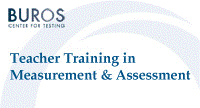Buros-Nebraska Series on Measurement and Testing

Teacher Training in Measurement and Assessment Skills
Date of this Version
1993
Document Type
Article
Citation
Published in Teacher Training in Measurement and Assessment Skills, edited by Steven L. Wise (Lincoln, Nebraska: Buros Institute of Mental Measurements, University of Nebraska–Lincoln, 1993).
Abstract
I began thinking about the relationship between measurement knowledge and teacher effectiveness a few years ago when our Teachers College was considering curriculum changes in our undergraduate teacher education program. Many questions about the amount and type of measurement knowledge to be included in our teacher preparation programs were raised and discussed. The recent Buros-Nebraska Symposium on Measurement and Testing related to this topic and the chapters included in this volume have resulted in further consideration of this issue. My review and analysis of this information indicates that there are many unanswered questions about the relative importance of measurement knowledge for prospective teachers. Research in other areas of education and psychology suggest that knowledge (of measurement or whatever else one chooses) may contribute only a very small percentage of the variance to that which is effective teaching.
My primary objective for this chapter is to provide an alternative perspective on how measurement training should be undertaken with teachers. Towards that end a review of what is known about effective teachers and the implications of this information for understanding the skills that must be trained will be provided. Next, a brief overview of research from the parent training literature will be examined in order to provide some examples of how the training process for teachers might be made more efficient. One example of the use of innovative measurement procedures and technology to improve children's academic performance is reviewed. Finally, specific suggestions for future efforts in preparation of teachers for effective educational measurement are provided.
OVERVIEW: KNOWLEDGE AND TEACHER EFFECTIVENESS
Most of the contributors to this volume feel very positively about the importance of measurement knowledge for teachers. They have written about the need for insuring that prospective teachers have adequate knowledge of relevant measurement concepts and practices. Teacher effectiveness has been suggested to be related to knowledge of assessment practices (e.g., Stiggins, chapter 2, this volume), grading procedures (e.g., Terwilliger, chapter 4, this volume), classroom evaluation (e.g., Gullickson, chapter 1, this volume), and testing (e.g., Marso & Pigge, chapter 6, this volume). The issue of teacher knowledge in educational assessment is felt by some to be important enough to develop and promote standards for teacher competence in educational assessment of students. There is a widespread belief among both general educators and measurement experts that teachers are not very knowledgeable about educational measurement and there are data available in support of these beliefs (e.g., Wise & Lukin, chapter 7, this volume).


Comments
Copyright © 1993 by Buros Institute of Mental Measurements. Digital edition copyright © 2012 Buros Center for Testing. This book may be downloaded, saved, and printed by an individual for their own use. No part of this book may be re-published, re-posted, or redistributed without written permission of the holder of copyright.